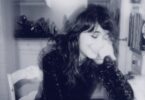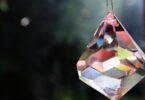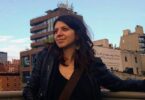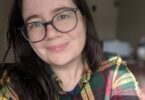It is late April, too early yet for tourists. The cashier looks at me through a pair of smudged glasses that perch precariously at the tip of his nose. His curious eyes study my features, searching for clues: a hint of an Adam’s apple or eyebrows that are just a smidge too thin. He is considering the breadth of my hips, the length of my eye lashes. He wants to know what I am.
I pay for the gas in cash. This is the last chance I will have to fill up before I head through the mountains. I am thankful for the clothing that Ammie gave me: an XXL hoodie and a pair of denim overalls. In them, I am a shapeless mass.
The climb out of the valley is steep and winding, the snow piled three-feet deep on the shoulder. Signs every few kilometres warn of landslides, avalanches, and falling boulders. My palms are sweaty on the wheel and every corner is a blind turn. At several points, the road is unpaved and the truck tires slide on the loose gravel.
I feel the thing moving inside me, pushing against my organs as my pulse quickens.
◊ ◊ ◊
The first time I met Ammie was when she came to take my blood. I sat on the examination table in a thin gown that barely reached my knees. She scanned my chart before she looked at my face.
“Miss Thorn?” she asked. When I shook my head, she tried again. “Mister?”
“Just call me Alex,” I said.
I watched as she prepared the needle, enjoying the swift, confident movement of her fingers. When I asked if she was the doctor, she raised an eyebrow. “No, I’m one of his assistants,” she said. “You’ll meet Dr. Mulligan eventually.”
“What’s it for?” I asked, trying not to wince.
“Just the usual carrier screening,” she told me. “STIs, genetic disorders—that sort of thing.”
She checked my blood pressure. She measured my weight and height and made me urinate in a little cup with a pink plastic lid.
It would be another five weeks until I met the other participants; before successful insemination was confirmed, we were kept separate and carefully monitored. I never did meet Dr. Mulligan. I would have seen him at the birth, I guess, but I didn’t stick around long enough for that.
◊ ◊ ◊
We met once a week in the basement of an Anglican church a short distance from Dr. Mulligan’s clinic. Six chairs arranged in a haphazard semicircle. The carpet beneath our feet stained from years of spilled coffee and cookie crumbs and juice, remnants of baptism celebrations and strawberry socials. I felt the others looking at me, taking in my cropped hair and pierced lip, my plaid shirt with the sleeves rolled up past the elbows.
Sarah cleared her throat. She was a few years older than me, with curly hair and silver earrings that reminded me of fish scales glinting in the dusty light.
“I think you might be in the wrong place,” she said. I wondered if she thought she was being kind.
“I’m one of Dr. Mulligan’s patients.” I extended my hand across the semicircle. “Alex.”
The silence that followed remained unruptured for several long, lingering seconds. Sarah stared at me with her lips pressed in a hard line. I withdrew my hand and shoved it firmly in my pocket.
It was Anjali who came to the rescue. Tossing her long dark hair over her shoulder, she let out an exaggerated sigh and said, “Well, this is the strangest support group I’ve ever been in.” We all laughed. Not because it was funny, but because it was true.
Most of us were first-timers, myself included. Anjali told us that during her first pregnancy she participated in a clinical study for a prenatal drug that had never been officially approved for market sale. (“Don’t know what they thought was wrong with it, my little girl turned out just fine.”) Sarah and Becka both confessed that they had volunteered for psychological research studies in college.
We didn’t talk about why. Not at that first meeting, and not at any meeting after. There was no need. We had each been promised sixty thousand dollars. That was why enough.
◊ ◊ ◊
When I was small, my mother would take her atlas down from the shelf in her studio and let me play with it. On each page, a different world. Tasmania. Baffin Island. Cape Town. Strange coastlines and mountain ranges that offered anonymity. I imagined myself grown up, free to go where I pleased and to become anyone I wanted to be, not just girl-Alex who didn’t understand the unspoken rules of femininity, but Alex-Alex, complete and whole and alive. The atlas seemed to contain endless possibilities of geography. One day, after my mother’s death, it vanished, lost somewhere in the chaos of grief.
I was already working two jobs when I saw the advertisement seeking medical study participants plastered on a telephone pole downtown. Five days a week, I folded and re-folded t-shirts adorned with cartoon moose and beavers dressed as Mounties at a souvenir shop by Canada Place. Then, on Thursday, Friday, and Saturday nights, I bar-backed at SPRUNG, a watering hole on Davie Street well past its prime. The club catered to a crowd of middle-aged queens who tipped well enough if left alone to do lines of coke in the dark booths. It was an under-the-table kind of gig. Getting the manager to hand over my cash at the end of the night meant flirting with him at just the right moment, when he was drunk enough to forget that he would never, ever hit on someone like me sober.
My friends were graduating from college, moving to new cities, starting new jobs. I was living with two roommates in a crumbling building on a stretch of West Broadway that hadn’t yet succumbed to the wave of gentrification that was slowly but determinedly devouring the city. My room was a converted walk-in closet with just enough space for a twin-size mattress. A pair of milk crates, stacked on top of one another and zip-tied together, served as both bookshelf and nightstand.
When things were slow, I looked up last-minute flight deals on the computer in the souvenir store, thinking that if I had the money I would take a taxi to the airport and get on a plane and never have to arrange another display of made-in-Taiwan totem poles or be called “Sir” (or worse, “Ma’am”) by another one of the American tourists that swarmed off the cruise ships in sweaty, geriatric droves.
Dr. Mulligan’s ad was clear: ten thousand dollars up front, plus room and board for nine months. Another fifty thousand when it was all over. It sounded like a good deal at the time.
I wish I could say that I did it because I wanted to contribute to pushing the boundaries of scientific discovery, but I’ve never been one for bullshit. It was about the money, mostly. I also thought maybe growing life inside me would be the missing link, the secret to womanhood that had eluded me for so long.
It wasn’t.
◊ ◊ ◊
I was killing time in the shopping mall on the ground floor of the building that housed Dr. Mulligan’s clinic, trying to ignore the fluttering thing in my belly, when I heard my name.
“Alex!” Ammie waved from across the food court and I hesitated, wondering if I was allowed to speak to her outside of the examination room. There were so many rules that it was hard to keep track: no drugs, alcohol, or caffeine; only moderate exercise—long walks or yoga or swimming—nothing strenuous or overly taxing; no hot tubs or saunas; no visitors or phone calls or unapproved electronic devices. I still had the full list of regulations somewhere in my room, buried under a mountain of soiled hoodies and jogging pants I was too exhausted to put in the wash.
Her smile was wide and welcoming. What could be the harm? I lowered myself down across from her at one of those awful tables that are a fixture of every food court, the laminate surface streaked with grease and crusted ketchup. She pushed the remains of a carton of French fries toward me. “You look hungry. Eat.”
“You know I’m not allowed that shit,” I said.
Our diets were strictly monitored; we were fed a steady stream of prenatal vitamins and supplements. The goal was to eliminate variables and create, as much as possible, an ideal environment for the fetus to develop. The thing inside me had other ideas. I craved ice cream and gummy worms and steak (though I hadn’t eaten red meat since I was a kid). Fat and sugar and salt. I eyed the fries and felt it squirm. My body was no longer my own.
Ammie winked at me and nudged the fries closer. “Go on,” she said. “I won’t tell if you don’t.”
Some pleasures are worth the risk.
Later, after I wiped the salt from my greasy fingers, Ammie took me upstairs to the clinic and showed me the ultrasound images. It was against the rules, of course, but I watched in fascination as her pink acrylic nail traced the grainy shapes. She pointed to the outline of the skull. The elongated jaw. The squished snub of a nose. The feet with toes as long as fingers.
I wanted to ask: “What will happen to it?”
I wanted to ask: “What will happen to me?”
Ammie had poked me with needles and taken scans of my uterus. She watched the tiny, half-way thing that was growing inside me and never once expected me to be a certain way about it. Maybe that’s why I trusted her in the food court, why I knew I could trust her now.
I looked around the room, at the monitors and charts and complicated medical equipment I didn’t understand, and asked: “Has anyone ever done this before?”
“Not that I know of,” Ammie confessed. She watched my face as she spoke. “The Soviets tried it in the twenties with human sperm and primate carriers, but the chimpanzees kept dying. They dissected both the carrier and the fetus afterward but couldn’t discern exactly why it didn’t work. The theory is scientifically sound. Genetically, we have fewer chromosomes, but that doesn’t negate the possibility of hybridization. Dr. Mulligan thinks the key is using human carriers.”
I wondered about the small petri dish of cells, the cluster of genetic material that had been inserted into my body. I wondered who had signed off on it, what sort of paperwork had been required. “Is it legal?”
Her laugh was bitter. “When you’ve got more money than God, anything is legal.”
◊ ◊ ◊
Cassie and Tracy were the first to disappear. One week they were there with us in the church basement, then they weren’t.
Three weeks after that, Becka stopped showing up too.
That’s when Sarah began to tell Anjali and me about her nightmares.
“There is hair everywhere.” Her hands were clenched in her lap, her knuckles white. “Fur, I guess, is a better word for it. It is thick and bristly, and it itches. I keep trying to do things, ordinary things like folding the laundry or reading a book, but the itching keeps getting worse and worse. I can’t focus. I scratch and I scratch but nothing helps so I scratch harder. I poke toothpicks into my skin and my belly is raw and red and the itching just won’t stop. As I scratch, the skin starts peeling away. Sometimes, in my dream, I take a knife and try to cut it out of my body. I feel the fur, wet with blood, beneath my hands but I can’t get it out. No matter what I do, I can’t get it out.”
The meetings were Ammie’s idea. She said talking would help us feel less alone.
I never had bad dreams, but after each meeting I circled the block, letting my feet take me around the parking lots and overgrown hedges. I imagined myself in another country, strolling down a strange street in a faraway city. I thought about the person I would be when all of this was over.
◊ ◊ ◊
Ammie told me about a place up north, past Dawson City. We were in her pickup truck, on our way back from dinner at a Thai place Ammie knew out in the suburbs, somewhere no one knew either of us.
“I was a field assistant,” she said. “It was my job to collect water samples from one of the streams that fed into the Yukon River.”
I had never been farther north than Kelowna. The Yukon might as well have been another continent. I thought of all the places I travelled in my mind when I was a child, all the places I would go if I ever got the chance: Tasmania, Baffin Island, Cape Town. I added Dawson City to the list.
“Did you see the northern lights?” I asked Ammie.
“Not in the summer. It doesn’t get dark enough.”
“Oh.” I felt it had been a foolish question, but Ammie reached across the space between the front seats and took my hand. She gave it a small, comforting squeeze.
“Lots of people go up there to disappear,” she said. I turned to look at her, but she kept her eyes fixed on the road ahead. “They build a cabin, or find one that’s been abandoned, and no one hears from them again.”
◊ ◊ ◊
One afternoon in April, I arrived at the church and found only two chairs set up in the middle of the room. I sat in one and waited. A few minutes later, Anjali arrived. We looked at one another.
“Do you want to go for a walk?” she asked.
We made our way down the street slowly, both of us encumbered by our bellies.
“Tracy miscarried,” Anjali said, her voice almost a whisper.
“And what about the others?”
Across the street, a woman was carrying a small dog. It barked at us, and I felt Anjali flinch. She looked down at the sidewalk, at her swollen feet and cheap plastic sandals. Trust is not something that is earned. It is nothing more than proximity and desperation. “I don’t know,” she said. “But I think we need to be careful.”
“Why?”
She hesitated, and I sensed the others had been talking without me.
“Sarah’s came a week ago,” she said at last. There was more. I waited. Anjali took a deep breath. “It was premature. She said it was alive when they took it from her. Then they told her it was dead.”
I wondered what it looked like. Had it had fur, or fangs? A tail? I held my tongue. “A defect?” I asked.
Anjali shook her head. “I don’t know. She wasn’t making much sense the last time I talked to her. They had her on some medication and she was going in for another surgery, but I haven’t heard anything since.”
I thought of what Ammie had told me about the first experiments, that afternoon she showed me the ultrasound images. They dissected both the carrier and the fetus. I thought of Sarah, her dark hair and fish-scale earrings. Alone in an operating room with Dr. Mulligan and a freshly sharpened scalpel and no one but us who knew she was there. I hoped she had broken the rules and told someone else, a boyfriend or a sibling or her hairdresser, someone who could sound the alarm. But what good would it do?
When you have more money than God, anything is legal.
Anjali grabbed my hand and pressed a slip of paper into my palm. When she let go, I snuck it into the pocket of my sweatpants as nonchalantly as I could manage.
“Sarah gave it to me,” Anjali explained. Her voice was so low that I had to lean toward her to hear. “She never got to use it and it’s no good to me. I can’t go anywhere. My babies need me.”
“Thank you,” I said, knowing there was nothing else to say.
◊ ◊ ◊
The address on the slip of paper took me to a duplex in Burnaby. A familiar pickup truck was parked in the driveway, but the blinds were closed. I rang the doorbell and waited.
Part of me hoped that no one was home, that I would waddle back down the drive and in four weeks I would go into labour and give birth to something that I would never have to see or touch and in exchange I would be given the rest of my sixty thousand dollars and the chance to get on with my life.
I remembered Sarah. The thing was no longer in her womb. It was supposed to be over, but Dr. Mulligan was going to split her open anyway. Maybe he already had.
It would never be over. None of us would ever see that sixty thousand dollars and there would always be Dr. Mulligan, or someone like him. Someone who thought it was their right to cut us open just to see what was inside. Someone who would reduce us to the sum of our organs: liver and lungs and heart and womb.
I rang the doorbell again. Ammie answered.
◊ ◊ ◊
The highway from Whitehorse to Dawson City is mostly unpaved. The sun is bright but a glacial wind shudders through the stunted pines. I keep the windows rolled up on account of the dust and the bugs. The half-way thing in my belly is calmer now and I wonder if it is sleeping. The sun hovers above the horizon. In a few hours it will dip out of sight, but not for long. It will not be truly dark again for months. Not here.
In the back of my mother’s atlas was a reprint of an antique map with strange continents and unfamiliar oceans. Unknowable places marked with a familiar warning: Here be monsters. I was always drawn to the edges, to the unidentified corners of the world that beckoned with possibilities.
As I drive, I think about the cabin. I picture every detail of what I hope it will look like: wooden floors, a set of mounted antlers above the door. There will be a woodstove and a small stack of firewood in the corner, a sheepskin throw draped over the back of a rocking chair.
If I concentrate hard enough, maybe the images will carry through my body and down the umbilical cord. Maybe it will feel my thoughts rushed together with the nutrient-heavy blood.
I am hoping it will understand.
There will be no one to help me, but there will be a bag in one of the kitchen drawers with a set of instruments inside. And drugs, for after. There will be a small vial on the counter and a soft blanket to wrap the half-way thing in and I will hold it against my body until it grows cold but will regret nothing.
Or else, I will leave the vial untouched and feel another heartbeat next to mine and come winter, when the sun goes down, we will watch the northern lights together.
…
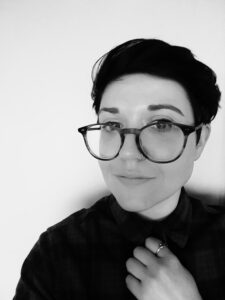 Shannon Page is a writer, film critic, and educator living on the unceded territory of the Musqueam, Squamish, and Tsleil-Waututh peoples. Their stories have appeared in Grain, Foglifter, Untethered, and elsewhere. You can find her on Twitter at @ShannonEvePage.
Shannon Page is a writer, film critic, and educator living on the unceded territory of the Musqueam, Squamish, and Tsleil-Waututh peoples. Their stories have appeared in Grain, Foglifter, Untethered, and elsewhere. You can find her on Twitter at @ShannonEvePage.
..

